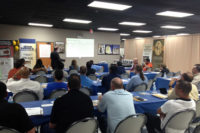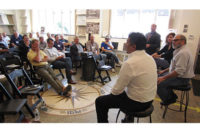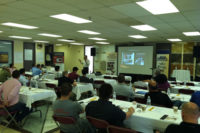These forums transcend a fabricator’s level of experience, as new challenges are cropping up on a continual basis. With this in mind, these sessions are a key component of the Marble Institute of America (MIA)/Stone World Industry Education Series, which begin this month. Events are taking place in the following cities and regions:
• Hayward, CA — February 13, 2014
• New York/New Jersey — April 17, 2014
• Raleigh, NC — March 20, 2014
• Toronto, ON — May 14, 2014
• Washington, DC — June 19, 2014
• St. Cloud, MN — September 19, 2014
• Phoenix, AZ — November 6, 2014
• Orange, CA — November 11, 2014
Among the Fabricator Forums that took place last year, a lively session was held at MSI’s facility in Seattle, WA, and it included the following panelists:
• Ray Monson, Founder’s Choice Cabinets and Counters, Tacoma, WA
• Raymond Henderson, Pi Granite Fabricators, Nanaimo, BC, Canada
• Mike Birdwell, FloForm Countertops, Kent, WA
How are you able to keep your employees happy?
Birdwell: To start with, make sure your work environment is clean and that they have an opportunity to get things done on time. Spontaneous events like a barbecue or even some ice cream on a hot day go a long way.
You need to give them feedback on where the company is headed. Let them know the amount of square feet you’re doing.
Audience Member: Reviews are key. You need to let your employees know what is going on, and how they are a part of that, so they’re not worried about their job. You should also be cross-training good workers, so they’re not at the whims of employment cycles. Those are the ones that you want to hang onto.
How do you make a good first impression with a customer?
Monson: When I meet new people, attitude is key. There was a New York University study that reported people make 11 evaluations in the first seven seconds that they meet someone, so there are certain things that I do:
1. Say it is going to be a great day.
2. Stand up straight
3. Smile. If you keep smiling, people
smile back.
4. Maintain eye contact.
5. Raise my eyebrows.
6. Shake hands.
Audience Member: You need to show confidence without being overconfident. If you overpromise, the customer will pick up on it from your body and facial signals.
We wear a lot of hats, and you need to collect yourself and think about how you want to be treated. Your appearance is huge. If you look like you just woke up, you won’t be taken seriously.
Henderson: Again, you have to look at cleanliness in your facility. Look around here at MSI. It is immaculate. I heard someone comment that it looked like you could eat off the floor here.
How do you increase shop efficiency? Is it a matter of increasing automation?
Birdwell: It really depends on the operation. We are high volume, and Moraware job-tracking software gives everyone transparency on where production is. Our templaters all work off Prodim Proliner templaters, and they have laptops with them in the field.
Monson: We aren’t fully automated. It is a matter of money to some degree, but full automation isn’t the only way to go. It is the mindset of the people in the shop.
Audience Member: I agree. It is a culture that starts with ownership. The whole company has to be committed. We have seven guys on the road, and they are all running Prodim Proliners. It took them one month to get proficient at it. We have some older guys on the road, so that proves that developing a new skill set is still workable.
Is anyone having problems with sink manufacturers not sending out templates?
Birdwell: We make a wood template of every sink, and we bring it out when we measure. We usually supply the sink, and if the customer isn’t sure about what they are doing about a sink, we say, “If you don’t have a sink, one will be provided for you.”
Henderson: We have a similar procedure in place. We require sinks to be on site when we measure.
How do you go about locating and hiring employees for the office, shop, etc.?
Henderson: We have outsourced human resources for that — including the office and the field. They run the ad, send out responses and conduct the first interview.
Monson: There are enough quartz and stone people in my area that it isn’t all that difficult. It is tougher to find people to do solid surface, though.
What kinds of equipment investments are being made?
Birdwell: We bought a double-table Fusion [bridge saw/waterjet]. It is important to remember that integration is as important as the machine that you buy. You need to look at all of your equipment and see how it will fit into the mix.
Henderson: We also bought a new machine from Park.
Monson: We’ve been holding back. We’re still walking slowly.
How do you deal with the fact that some shops have devalued granite by offering it for $20 per square foot?
Birdwell: Well, you shouldn’t just be looking at how many square feet you’re doing. Bigger isn’t always better. You want to sell more upscale kitchens. Sell them the sink, faucet, plumbing and backsplash.
Audience Member: You really need to have a portfolio, and not just a digital one. You should be displaying nice, physical 8- x 10-inch photos to get your customers enticed. You are still selling a luxury item, and you have to possess the knowledge to sell to them. It all comes down to education and creating a positive “selling experience.”
But how are you able to show the difference in quality?
Audience Member: The east side of Seattle has money, and they value good work. We approach those customers differently, and we qualify them differently. We remind them of the full scope of the work, and the nuances of a remodeling project. We do things that our competitors won’t do. We want our customers to call our references and know that everyone at our place respects and cares for their home.
Monson: We choose what we sell very carefully. And throughout the process, we show that we are in this together.
Audience Member: You really want to sell the whole experience, and you want to be a one-stop shop for everything — removal of the old counters, the sink, the faucets, the garburator.
Does anyone have any fab-only or contract customers?
Audience Member: That can be bad for our business. We hada competitor who only did installs. He was completely undercutting us because he had a deal with a local stonecutter, so all he needed was a truck and some tools, and he could charge next to nothing.
Birdwell: If we fabricate for someone else, it will not be cheap. We know that the install cost is low, so we want to protect the value of the product. We have procedures in place where we won’t template if we don’t install, and we don’t install if we don’t template.
How do you understand your costs?
Birdwell: I actually know quite a bit about that now, right down to our CNC cost per square foot. There is no easy way to collect the data. You need to have spreadsheets and understand what everybody did at the end of every day.
Henderson: It is an investment in looking at exactly what was done each day.
Audience Member: We have time sheets, and we log exactly how much time was spent on each job — even the grinding and polishing.
What about tracking your electric and water costs?
Audience Member: We keep track of square footage more than anything else. We look at how many square feet we run in a month, and then we look at what our costs were. Once you have a few months behind you, you can tell what you are able to do and how much it costs.
Targeted education for fabricators
In addition to the Fabricator Forum, the MIA/Stone WorldIndustry Education Series offers targeted educational sessions specifically geared to help fabricators run their operations. These include detailed sessions on topics such as understanding and managing costs as well as marketing.
At the Seattle session, this education was led by Marty Gould, who has been focalizing businesses and organizations for more than 20 years. As President of Focalize Consulting, Gould works with a wide range of companies and organizations, helping them focus their business, marketing and communications strategies so they can achieve their goals. His client list over the years includes some of America’s most well-known brands, including AC Delco, Pepsi-Cola, Anheuser-Busch, Lennox Industries and the Professional Bowlers Tour.
(Editor’s Note: The following is a brief summary of Gould’s presentation. To register for the full event, visit www.StoneIndustryEducation.com.)
“Back in 2007, stone companies didn’t have to market themselves,” Gould explained at the Seattle event. “Now it is a necessity. Just as you do in the shop and in the field, you need to look at what is in your ‘tool kit’ when it comes to marketing. Is there anything to make things easier? Is there anything to make things faster? Is there something to help you do something that you wouldn’t be able to do on your own. Good marketing tools make it easier to acquire and retain customers.”
Defining a business and its goals
In order to successfully market a fabrication business, Gould said it is essential to analyze the operation itself: “What are you building? Are you building reputation? Positioning? Awareness? What one thing makes you different from the competition? Say to yourself, ‘I went into business because…’ “
Gould went on to discuss what a successful mission statement should accomplish:
- Energize stakeholders
- Focus on common goals
- Prioritize allocation of resources
“Don’t do a ‘typical’ mission statement,” he said. “It won’t mean anything if people can’t relate and respond.”
Speaking specifically on the stone sector, Gould addressed an issue that concerns many shops these days — low-end cheap fabricators. “Everyone fears the guy who sells out of a truck,” he said. “He’s under our skin perpetually, but you shouldn’t make decisions based on fear, losing money or competition. You need to go from fear to confidence and then consider how many customers you need to acquire to reach your revenue target.
“Think of your unique position,” Gould continued. “What makes you different? What are you known for? Who needs what you offer? Think of your customer behavior and what would make them satisfied. Do you have a plumber? Do you hook up the sinks. If you’re done with the kitchen countertops, but there still isn’t a sink, the customer isn’t really satisfied.”
Customer data that fabrication shops should be looking to capture are their address, birthday, valid e-mail address (extremely important for online marketing) and future remodeling plans.
Data that a shop might want to buy includes a list of household incomes in a given area. “A person doing an $11,000 kitchen has a different income than one doing a $75,000 kitchen,” Gould said, adding that determining the value and age of homes in a region is also useful. “A total of 57% of homes are between eight and 28 years old, so that tells you quite a bit.”
It is also important to have a specific plan of execution. “Schedule all of your marketing activities,” he said. “Make a plan and a budget to go with it.”
Effective Internet marketing
During his presentation, Gould offered a critical analysis of the website of every single fabrication shop in attendance at the event — complete with their Alexa and Google rankings. This is a practice that he has done in the past, and he is able to identify critical flaws in them. “You need to consider what a website really is,” he said. “It is not a destination, but rather a hub. It is a home for content. Search engines like Google drive all Internet activity, and there are a lot of things that people don’t realize about Google. For instance, Google can’t see pictures; it works off of words. So if your message is set within a picture, Google doesn’t recognize it.”
Gould also outlined some basic principles of online marketing. “Information is free, but getting someone’s attention is expensive,” he said. “You need to consider what online marketing is, and what it is not.”
Online marketing is not:
- A brochure
- Television
- A sales pitch
- Easy
Online marketing is:
- Interactive
- Collaborative
- Customer controlled
- Free, but expensive
Classic mistakes:
- Focus only on the website
- Ignore Social Media
- Ignore searches
- Not building a prospect list
In reviewing the websites of the fabricators in attendance at the MIA/Stone World Industry Education event, Gould said there were some common threads. “All of the fabricator sites look similar to one another,” he said. “They all open up with a photo of a kitchen, and they all promote ‘quality and service.’ You are all in love with your stone, but at a glance, does any kitchen look better than any other? Plus you’re just showing the kitchen, not people actually enjoying their kitchen. You have all placed yourselves in a corral, and everyone is following each other.
“Many of these sites don’t have any words on the opening page,” Gould continued. “Don’t try and dumb it down. A picture is not worth 1,000 words on Google, so you can’t sit back and say, ‘I’m going to let the picture tell the story.’ An entire page of photos is not even recognized by Google unless it is tagged. When I searched one of the fabricators here, their review on Yelp came up before their own website. There was another site that was ‘under construction’ and this gives a very bad impression of a lazy company.”
Gould also offered some basic tips that should apply for every website:
- A ‘Contact Us’ link should appear on every single page
- Create a meta description of 70 to 100 characters and avoid adjectives. “It doesn’t even have to be done in sentences,” Gould said.
- Remember that if you have a coupon on your site as a jpg, it will not be read by Google. “You need alt text or real text,” he said.
- Create relevant content and establish external links
- Focus on searchable keywords that will make customers find you. “Not words like quality and pride.”
Of course, the above synopsis is only a fraction of the educational and networking opportunities at every MIA/Stone WorldIndustry Education event. For more information and to register, visit www.StoneIndustryEducation.com.









